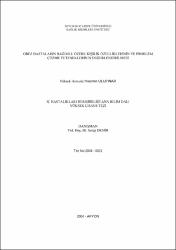Obez Hastaların Bağımlı- Özerk Kişilik Özelliklerinin ve Problem Çözme Yeteneklerinin Değerlendirilmesi
Özet
Obezite kişinin duygu durumunu, kendi vücut imajını algılamasını, sosyal hayatını, kişilik yapısını etkileyen önemli bir hastalıktır. Bu nedenle bu çalışma ile tüm bu etkilerin altında obez kişilerin normal vücut kitle indeksine sahip kontrol grubu ile karşılaştırmalı olarak bağımlı-özerk kişilik özelliklerinin ve problem çözme yetenekleri konusunda kendilerini nasıl algıladıkları değerlendirilmiş ve yaş, cinsiyet, medeni hal, eğitim düzeyi, gelir düzeyi, çocuk sayısı gibi faktörler bu açıdan araştırılmış ve yine bu faktörler obezite riski yönünden incelenmiştir.
Bu çalışma Eylül 2002-2003 tarihleri arasında Afyon merkez ve ilçelerinde yaşayan rastgele 152 kişi üzerinde yapılmıştır.152 kişi 3 gruba ayrılmış 1. grup obez, 2. grup fazla kilolu, 3. grup normal kilolu kişilerden oluşturulmuştur. Bu gruplama vücut kitle indeksine (VKİ) göre yapılmıştır. VKI > 30 kg/m2 olan olgular obez , 25-29,9 kg/m2 arasındakiler fazla kilolu , 18-24,9 kg/m2 arasında olanlar normal kilolu olarak kabul edilmiştir. Çalışmaya katılan 152 kişi obezite dışında ek hastalığı olmayan, sağlıklı kişilerden seçilmiş olup, herhangi bir hastalığı olanlar çalışma dışında bırakılmıştır.
Çalışmaya katılan kişiler yaş, çocuk sayısı, medeni hal, cinsiyet, çalışma durumu, eğitim düzeyi, obezite tedavisi alıp almadığı durumuna göre incelenmiştir. Olguların bağımlı- özerk kişilik özellikleri ve problem çözme yetenekleri konusunda kendilerini nasıl algıladıkları sırasıyla sosyotropi- otonomi ölçeği ve problem çözme envanteri (pçe) ile değerlendirilmiştir.
Çalışma sonucunda obez ve normal kilolu kişiler arasında sosyotropi- otonomi ve pçe puanları arasında anlamlı bir fark bulunamamıştır (p>0,05). Yaş, cinsiyet, medeni hal ve çalışma durumunun obezite için birer risk faktörü olduğu (p<0,05) , fakat eğitim düzeyi ve çocuk sayısının risk oluşturmadığı saptanmıştır (p>0,05). Bayanların erkeklere göre, evli olanların bekarlara göre, aktif bir işte çalışmayanların çalışanlara göre obezite oluşumu açısından risk taşıdığı tespit edilmiştir.
Sonuç olarak obezitenin daha önceki çalışmalarda bildirildiği gibi depresyon, anksiyete, öz sevgi/saygı azlığı, vücut tatminsizlikleri, hor görülme ve dışlanma duygusuna neden olmakla birlikte kişilerin bağımlı –özerk kişilik özellikleri ve problem çözme konusunda kendilerini nasıl algıladıkları üzerinde bir etkisi olmadığı kanısına varılmıştır. Evaluation of dependent- autonomous personality characteristics and problem solving ağabeylity of obeze patients.
Obesity is important ilness, affecting the mood, body image perception, social life and personality structure of the people. Therefore the obese people were evaluated as to how they perceive themselves as compared with the control group who have normal body-mass index in terms of their problem-solving abilities and dependent autonomous personality structure under all these parameters through this study. To this end age, gender, marital status, educational level, number of children and similar factors have been examined from the point of the obesity risk.
The present study was carried cut on a random sample of 152 persons living in Afyon province and townships between September 2002-2003. This random sample of 152 persons was divided into 3 groups. Amongst these 1st group was composed of obese people, 2nd group was composed of people of excessive weight and the 3rd group was composed of people of normal weight. This grouping was carried out according to body mass index. The cases where VKI > 30 kg/m2 were considered to be excess of weight and those cases where VKI ranges from 18 to 24,9 kg/m2 were considered to be normal weight. 152 persons participating the study were selected from the healthy people who do not have any disorder other than obesity and those who have any disease were left out of the study.
The persons participating the study were examined as to the age, number of children they have, marital status, employment state, educational level and as to the fact whether they received obesity treatment or not. The cases were examined in terms of dependent – autonomous personality -personality patterns and their problem-solving abilities according to the socio-tropy-autonomy scale and problem-solving inventory (pçe).
As a result of the study a significant difference was not detected among the socio-tropy, autonomy and pçe points between obese and normal weight people (p>0,05). Age, gender, marital status and employment situation were considered to be a risk factor for obesity (p>0,05) while educational level and number of children they have did not constitute a risk factor (p<0,05). The female people carry a risk compared with males; married people carry a risk compared with single people and people with no active job carry a risk compared with people with active job in terms of the formation of the obesity.
As a result, it has been concluded that obesity triggers depression, anxiety, lack of self-love/self-respect, body dissatisfactions, humiliation and a sense of ostracism as have been reported in previous studies. But it has no discernible effect on how they perceive themselves as to the dependant-autonomous personality patterns and their problem-solving abilities.
Bağlantı
http://hdl.handle.net/11630/4024Koleksiyonlar
- Yüksek Lisans Tezleri [636]



















